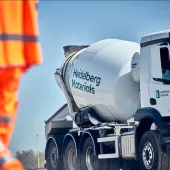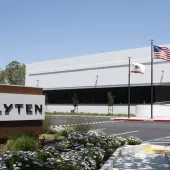Heidelberg Materials’ Padeswood CCS plans reach another milestone
Heidelberg Materials UK’s plan to create Britain’s first net-zero cement works at its Padeswood site in Flintshire, North Wales has reached a major milestone. The company has signed a front-end engineering and design (FEED) contract with Mitsubishi Heavy Industries (MHI) and Worley, marking a step closer to delivering carbon-capture technology at its Padeswood cement works.
Cement is a key component of concrete, the second most consumed material in the world after water, but its production is carbon intensive. A large proportion of these carbon emissions come from the chemical processes involved in making cement, so the only way to remove them is by capturing them before they enter the atmosphere.
Heidelberg Materials is proposing to build the new carbon-capture and storage (CCS) facility, which will capture up to 800,000 tonnes of CO2 a year as well as produce the company’s evoZero carbon-captured net-zero cement as early as 2028.
Simon Willis, chief executive officer of Heidelberg Materials UK, said: ‘This is a decisive next step in our plans to install carbon capture technology at our Padeswood cement works. Once operational, it will provide net-zero building materials for major projects across the country, enabling us to help decarbonise the construction industry and meet our ambition to become a net-zero business.’
Kenji Terasawa, chief executive officer and head of engineering solutions at MHI, commented: ‘Heidelberg Materials has committed to reaching net zero carbon by 2050 and will be deploying our proprietary carbon capture technology, the Advanced KM CDR Process, to tackle this challenge and lead the way in the UK’s cement industry.’
Marino Barbi, senior vice-president UK at Worley, added: ‘This is a first-of-its-kind CCS development in the UK and our appointment is a testament to the strength of our relationship with Heidelberg Materials and MHI, and our execution of the pre-FEED and extensive carbon-capture, utilisation, and storage capabilities.’
Heidelberg Materials’ plans at Padeswood are part of the HyNet North West decarbonisation cluster, which aims to create the world’s first low-carbon industrial cluster through its development of a hydrogen and CSS project.







